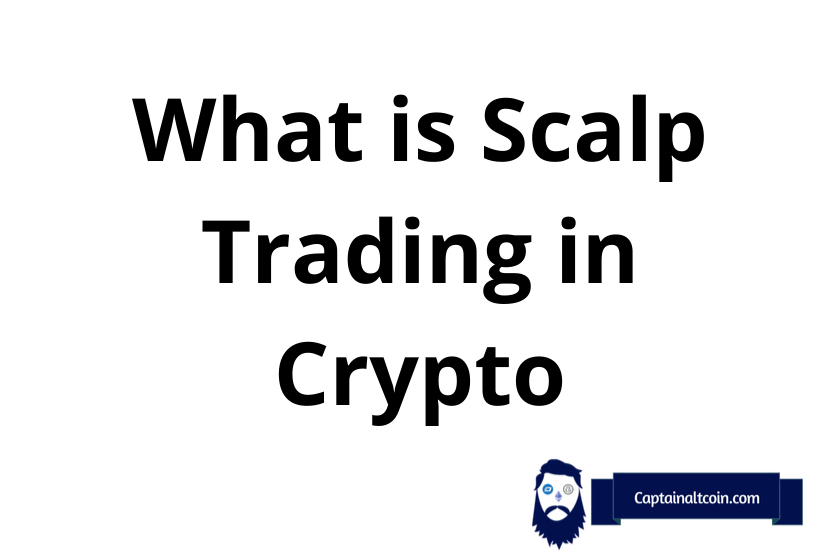
What you'll learn 👉
What is scalping?
Scalping is a day trading strategy that specializes in profiting from small price fluctuations in the crypto market.
How do scalpers make money?
Scalpers (traders who use this strategy) aim to make large gains by making from ten to hundreds of trades a day and compounding their small profits collected throughout the day. These traders use various indicators to find new opportunities and estimate their stop loss and take profit.
Different scalp trading strategies
Range Trading
The term “Range” range refers to the price movement between the high and low levels within a certain period of time. Basically, traders will enter buy and sell positions at different times, based on the price’s position within the range.
Once they have found the most accurate range, scalpers will aim to buy at the low levels (support) and sell at the high levels (resistance) until the range is broken. Trading ranges are more convenient when markets are flat.
Bid-Ask Spread
In this strategy, traders will take advantage of the bid-ask spread, which is the difference between the asking price (the lowest price a seller is willing to accept) and the bid price (the highest price that a buyer is willing to pay for a digital asset).
Whenever there is a considerable difference between the two, scalpers will make a profit by opening a position either at the asking price or the bid price and then closing their position at a higher or lower price.
In scalp trading, the bid-ask spread happens in two instances:
- Wide bid-ask spread: When there are more buyers than sellers, the asking price will surge and the bid price will be much lower than usual. Crypto scalpers will sell whenever this spread happens.
- Narrow bid-ask spread: In this scenario, sellers outnumber the buyers, which results in a lower asking price and a significantly higher bid price. Traders will be buying at this point.
Arbitrage
Since cryptocurrencies are priced differently on different trading platforms, scalpers can use arbitrage in order to make a profit by exploiting the price difference. There are two main crypto arbitrage types:
- Between exchanges: This strategy involves buying a cryptocurrency (Bitcoin for example) on an exchange and then selling it on another exchange where it is being sold at a higher price. Since you are moving your funds across different exchanges, there are some risks associated with this strategy like transfer fees and times.
Triangular arbitrage: This method takes advantage of the pricing inefficiencies between three cryptocurrency pairs on the same exchange. For instance, a trader owns an amount of a cryptocurrency, he trades this cryptocurrency for another one that is undervalued relative to the first digital asset.
Then, the trader will proceed by trading the new cryptocurrency for a third one that is relatively overvalued to the first one. Finally, the trader will finish by buying the first coin back, and he will end up with more crypto than the amount he initially had.
Price Action
This method involves monitoring the digital asset’s price movement and trying to find opportunities by interpreting it.
Margin Trading
Margin trading allows scalpers to reap huge profits even from small price fluctuations by letting them use the trading platform’s funds instead of their own. The exchanges that offer margin trading products include Binance, BitMex, ByBit, FTX, Kraken, and Bitfinex.
The margin varies from an exchange to another. Margin trading carries a lot of risk, especially in the highly volatile crypto markets. It is mostly geared towards more experienced traders because the results of losing margin trades can be devastating for your portfolio.
Visit Binance Now Visit BitMex Now Visit ByBit Now Visit FTX Now Visit Kraken Now Visit Bitfinex Now
How Scalp trading differs from Day trading
The main difference between scalping and day trading is the frequency at which trades are being carried out in each trading strategy. Scalping involves entering and closing positions in a very small duration. Day trading, on the other hand, focuses on monitoring a digital asset’s price movement in a longer duration.
Day traders positions should be closed before or by the end of the day. There are other differences between the two strategies, such as:
- Time frames: Whereas day traders need to monitor prices within a four-hour time frame for example, scalpers will need to track price movement within one to three minutes time frames.
- Profits: Both trading strategies can bring huge gains to traders. However, day trading brings bigger profits per each trade since it focuses on bigger price movements. In order to amplify their trades and make significant gains, scalpers need to use margin trading.
Scalping Crypto Tools
Bots
Bots are a popular tool among scalpers because they can keep up with the high frequency of trades in scalping. These bots use indicators and resistance and support levels in order while monitor the market for opportunities.
Usually, trading bots can be linked to exchanges such as Binance and KuCoin using API keys. Some of the more popular scalper bots are Cryptohopper, Bitsgap, Coinrule and Quadency.
Read also:
- Best Crypto Grid Trading Bots – Grid Trading Strategies
- 5 Best Cryptocurrency Arbitrage Bots
- Best Free Crypto Bots – Yes, Open-Source & Free Bots DO Work!
- Best Binance Bots – These Are Top Trading Bots For Binance
- Best Coinbase Bots – Crypto Trading Bots For Coinbase
- Deribit Trading Bot Review – What is The Best Deribit Bot?
Signals
Some scalpers prefer market signals. Those signals help scalpers make their trading decisions for certain cryptocurrencies at a specific time and price. They are either generated by experienced traders and technical analysts or created by computer software that analyzes the price movements of relevant cryptocurrencies.
Signals contain important information about the cryptocurrency to trade, time to trade, the price at which you will be entering either buy or sell positions, the target price at which you’ll close the trade, and, before anything else, your stop loss which limits your losses in case the trade was unprofitable.
Technical Indicators
Traders who want to succeed in scalping need to master technical analysis and be able to predict the price movement in smaller timeframes using scalping indicators. Those indicators are geared towards short-term opportunities and help scalpers make more successful trades.
Best trading indicators for scalp trading
Moving Average (MA)
This indicator helps scalpers understand the price movement of a digital asset by constantly calculating its average price over a specified period of time. Another key role of this indicator is to help scalpers identify a trend. For instance, if a cryptocurrency’s Moving Average is rising, it is on an uptrend.
On the other hand, if it is going down, then the cryptocurrency is experiencing a downtrend. Scalpers can use the Moving Average indicator to determine support and resistance levels as well. They usually use small timeframes with each indicator, since they need to monitor the cryptocurrency’s price movement closely in order to find opportunities and detect new market trends.
For example, here is Bitcoin’s Moving Average chart on a one-minute timeframe:
Source: https://cryptopurview.com/live-price/ 
Relative Strength Index (RSI)
The RSI is an indicator used by traders to determine the momentum and speed at which a cryptocurrency’s price is moving.
This indicator is also called an “oscillator” because it has a value that moves between 0 and 100. This value helps scalpers determine the areas at which a digital asset is being overbought or oversold. In the areas in which a coin is oversold, the price tends to rise exponentially in a short period of time. On the other hand, the price increases a lot within a small period of time in the areas in which a coin is oversold.
For instance, if a cryptocurrency’s RSI is lower than 30%, then that coin is considered oversold. Meanwhile, if a cryptocurrency’s RSI is above 70%, then that asset is considered overbought. If a cryptocurrency is being oversold, then scalpers can seize the opportunity and buy in since the price will most likely start to go in an uptrend soon.
However, if a cryptocurrency is being overbought, then it will most likely have a correction or a trend reversal. At this point, scalpers will be selling
One more key usage of the RSI indicator is defining the current price trend. If a cryptocurrency’s RSI reaches 70 or 80 levels, the coin is considered on a bullish trend.
Conversely, if a cryptocurrency’s RSI reaches 20 or 30 levels, that coin is considered on a bearish trend.
Support and Resistance Levels
Support and Resistance Levels are important tools for any scalper which help him determine or implement his trading strategy. For example, the Support and Resistance levels are key elements in the range trading strategy we reviewed above.
Support is a price level at which a downtrend is expected to pause due to high buying pressure.
Resistance is the opposite of support. It is the price level where the selling pressure overcomes the buying pressure, leading to temporary price stability in an uptrend.
Identifying resistance and support lines can be challenging for novice traders. In order to find support and resistance levels, traders can use swing highs and swing lows as they are usually lines of support and resistance, Fibonacci Retracements, and chart patterns.
Chart patterns
Chart patterns are an important aspect of technical analysis. They are basically shapes that can be seen on price charts in a repetitive manner over time. Scalpers use these patterns to predict a cryptocurrency’s price behavior.
Some of the most popular patterns include:
- Head and shoulders: This pattern is composed of three peaks, with the largest peak being in the middle and the other two smaller peaks around it. The head and shoulders pattern is an indicator of a trend reversal and can help scalpers determine when an uptrend or a downtrend is ending. Let’s take this Bitcoin price chart for example, we can clearly see the dip that followed the head and shoulders pattern.
Image source: https://altsignals.io/post/top-5-crypto-trading-patterns
- Ascending Triangles: The ascending triangle is a pattern that signals a continuation in an uptrend. Basically, the cryptocurrency’s price makes higher lows (makes smaller dips over time) by hitting an invisible line of resistance. Eventually, a breakout happens, and the price goes up and continues its bullish trend.
Image source: https://boxmining.com/crypto-technical-analysis-chart-patterns/
- Double Top: This pattern involves a cryptocurrency’s price making a peak, going back to a level of support, and then building enough momentum to make another peak again. Finally, the selling pressure pushes the price lower and causes a trend reversal.
Image source: https://boxmining.com/crypto-technical-analysis-chart-patterns/


Best Time Frame for Scalping
Scalpers open and close their positions every 5 to 10 minutes. In order to have a better look at the price movement and be able to spot trade opportunities, scalpers should use the 1-minute chart.
This chat is considered the best for scalping crypto because it works with most trading strategies, allows you to view recent market movements in detail, and helps you recognize chart patterns easily.
For instance, if you open a cryptocurrency’s five-minute chart alongside its one-minute chart, you can notice that multiple chart patterns we discussed above either don’t show up on the five-minute chart or are harder to spot than on its one-minute counterpart.
However, novice traders might not be able to use the one-minute chart effectively because it takes a lot of experience and speed. That’s why newbie traders should stick to 5 or 3-minute charts until they are comfortable with high-frequency trading and are able to do technical analysis quickly.
Pros & Cons
Pros
There are various perks of scalping crypto. You can easily automate your scalping strategy by building a bot or paying a company or someone to build it for you.
Moreover, scalping involves less risk than other trading strategies because scalpers usually take small positions. Furthermore, scalpers have a decent success rate since small price fluctuations occur more often than bigger ones.
Cons
Scalping can be really exhausting and demanding. It is geared for more seasoned traders who can deal with the tension that comes with this trading style.
Add to that, scalpers need to have really fast reactions as any delay can make them lose their trade, especially since they have to compete with scalping bots that have invaded the market. Finally, scalpers require significant capital in order to make decent profits and need to pay trading fees more often than most other traders.
Should I start scalp trading?
If you fit the criteria we described throughout this article then sure, you should start scalp trading.
In case you are a trader who has fast reactions, considerable capital, and can handle the amount of stress that comes with this trading style, you should really consider this type of trading because it might suit your needs and bring you decent profits.
Closing thoughts
In this article, we discovered various aspects of scalping. This trading style might not be the most suitable for the average trader, but it can also be a perfect approach for those who want to accumulate small profits over time without much risk involved.
FAQs
Is scalping crypto profitable?
That totally depends on the trader. For instance, a scalper who doesn’t have a clear and working trading strategy, a decent capital, and isn’t familiar with technical analysis, won’t make any considerable money by scalping or might even end up losing some of it.
However, if a scalper meets certain criteria that we mentioned earlier and is able to make multiple fast trades daily based on technical analysis, he will most likely end up making significant profits.
How do you scalp Bitcoin?
Scalping Bitcoin is pretty much the same as scalping Ethereum or mid-cap cryptocurrencies.
All you need is a profitable Bitcoin scalping strategy that you can either make yourself or learn from another trader.
Is scalping crypto illegal?
Crypto scalping is a trading style that isn’t illegal at all.
However, in some cases, regulators might ban crypto scalping in some countries or ban crypto trading in general. That means traders should always follow cryptocurrency news in their countries in order to make sure their activities are 100% legal.
Best cryptocurrency for scalping 2021?
Any cryptocurrency can be great for scalping if you are an experienced trader who has medium or advanced technical analysis skills.
Nevertheless, you should stick with cryptocurrencies that have a high volume and high volatility because they can earn you higher profits and don’t expose you to many risks in case you always set up a convenient stop-loss for every trade.






